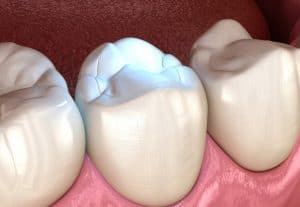 When you develop any kind of dental health concern and have to address it, the hope is usually that treating the problem means you won’t have to deal with it anymore. In many instances, and with proper care after your treatment, this is usually the case. For example, if you develop a cavity, which is the most frequent kind of oral health problem to develop, then treating it soon will stop the cavity’s progression. With a custom-made tooth filling, you can also restore the tooth’s healthy appearance, and have a better chance of preserving the tooth’s health and integrity long-term.
When you develop any kind of dental health concern and have to address it, the hope is usually that treating the problem means you won’t have to deal with it anymore. In many instances, and with proper care after your treatment, this is usually the case. For example, if you develop a cavity, which is the most frequent kind of oral health problem to develop, then treating it soon will stop the cavity’s progression. With a custom-made tooth filling, you can also restore the tooth’s healthy appearance, and have a better chance of preserving the tooth’s health and integrity long-term.
What needs to be fixed when a cavity forms?
A cavity often seems like a straight-forward problem. It describes a hole in your tooth that’s caused by the development and progression of tooth decay (an infection resulting from excessive oral bacteria buildup). In its early, mild, and moderate stages, a cavity only affects the main structure of a tooth’s crown, known as the dentin. If you treat the cavity in these stages, then fixing your tooth will likely mean cleaning the cavity thoroughly and carefully, then filling it with biocompatible material.
What factors into treating your cavity?
Tooth fillings have been a popular treatment for cavities for a long time, and remain one of the more effective restorative dental treatments. However, a filling’s ability to fix your tooth depends heavily on the extent of your cavity, which grows increasingly worse the longer the cavity remains untreated. Using advanced technology to design your treatment and highly lifelike, biocompatible composite resin to craft it allows us to treat most cavities successfully. Yet, if the cavity is allowed to continue growing and the decay becomes more intensive, then fixing your tooth could require more involved tooth decay treatment.
What can the filling do for your tooth long-term?
When tooth decay becomes severe enough, it affects more than just your tooth’s dentin. It can also reach the pulp chamber at the center of the dentin, where the tooth’s nerves and blood vessels also reside. An infection in your tooth’s pulp can compromise the root canal that’s connected to it, and fixing the tooth could require root canal treatment. If you treat your cavity early and take proper care of your teeth and restoration afterward, your tooth filling will have a good chance of helping you prevent the need for more extensive treatment later.
Fix your cavity with a custom-made tooth filling
When your tooth develops a cavity, fixing it is the only way to save the tooth, and your oral health, from more severe tooth infection. To learn more, schedule an appointment with us by calling Dreem Dentistry in Leawood, KS, today at 913-681-5500. We also serve patients who live in Overland Park and all surrounding communities.






